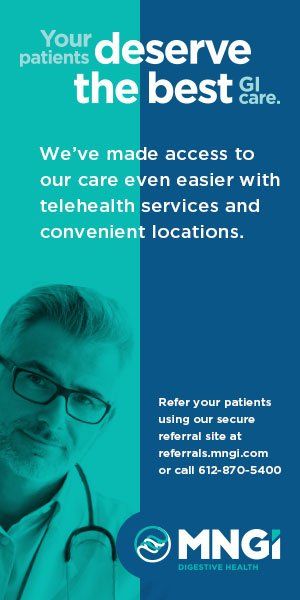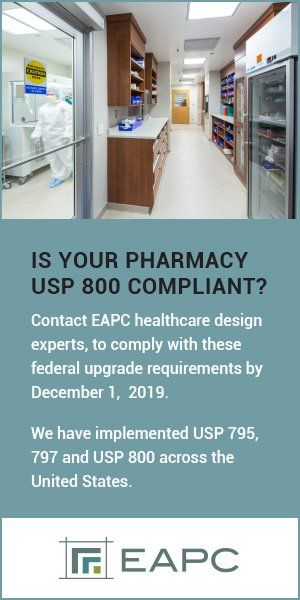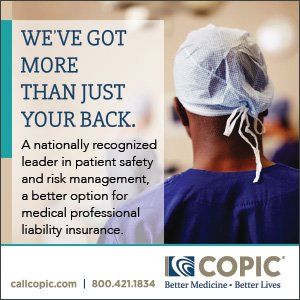Capsules
Allina Health Launches Comprehensive Cancer Institute
Allina Health has recently announced the launch of the Allina Health Cancer Institute (AHCI), a regionally differentiated cancer program that redefines how cancer care is delivered by providing comprehensive, expert, person-centric cancer care from diagnosis to survivorship. “We know a cancer diagnosis can be overwhelming for patients and their loved ones and fragmentation in care can add to the burden - and we recognize that needs to change,” said Allina Health President and Chief Operating Officer Lisa Shannon. Over the last 18 months, substantial resources were committed to launch a novel organization construct, which includes new and expanded facilities, like the previously announced new, comprehensive radiation oncology center within the United Hospital campus; as well as the recruitment of top physicians, management and caregivers. Badrinath Konety, MD, who most recently served as, Dean of Rush University Medical College and Senior Vice President for Clinical Affairs at Rush University System for Health in Chicago, joins the team as the AHCI President. “Our goal is to provide expert cancer care that is easily accessible and convenient to the patient,” said Dr. Konety. “We have numerous sites across a wide geographic area. The AHCI creates a network, everyone working together, to deliver comprehensive cancer care that fits the lives of our patients and their families. This model of connected care is one of the most important features of the services we can provide.” The “Institute” model of care offers an expanded suite of oncology services and reflects the commitment to prevention and detection, clinical innovation and research partnership, substantial emphasis on tumor-specific specialization, the importance of physician alignment with a strong focus on a multidisciplinary team of providers and processes needed to deliver whole person cancer care. “Our communities may notice a change to the look and name or our locations, but the real change comes from within the system,” said AHCI Vice President Michael Koroscik. “We will passionately strive for our patients and families to fully experience this reimagined commitment to care during every level of their cancer journey.”
Fairview Begins New Portable MRI Machine Trial
M Health Fairview has recently begun a trial of a new portable MRI machine – the Hyperfine® Swoop® Portable MR Imaging System™. This technology uses artificial intelligence (AI) to convert the signals detected by the MRI into detailed pictures of the brain. Traditional MRI units can weigh five tons or more and generate strong magnetic fields that require special medical suites for safe use. The use of AI with MRI technology allows meaningful images to be extracted from weaker signals. Because of this, an accurate scan can be performed with a smaller magnet and weaker magnetic field – which means the MRI machine can safely travel around the hospital and to a patient’s bedside. M Health Fairview is the only health system in Minnesota, and one of only a handful nationwide to trial this leading-edge technology. The fact that traditional MRI machines need to be in specialized suites limits who can receive scans. “Many patients are too sick to transport at times that an MRI is needed. Even for healthier patients, transport poses risks,” said M Health Fairview Neurosurgeon Clark C. Chen, MD, PhD. During traditional MRI scans, patients are also alone in a suite without the support of their friends or family. With the new portable MRI, patients can have their support system in the room during a scan, which can be especially helpful for young patients. So far, portable MRI scans have been performed in various hospital settings – including the emergency department, intensive care unit, post-anesthesia area, and the neurology/neurosurgery inpatient unit. Patients who receive a scan from the portable MRI during our trial also receive a scan from our traditional MRI machine. This way, clinicians can compare the results. “We are carefully evaluating the images from this portable unit and comparing them to traditional MRI and computerized tomography (CT) scans to ensure that patient care is not compromised,” said Chen. “Continued development of this technology means that someday clinicians could bring a portable MRI machine to wherever an MRI scan is needed.” The portable MRI will be trialed at M Health Fairview University of Minnesota Medical Center and M Health Fairview Masonic Children’s Hospital for a six-month period.
UCare and Leading Edge Partner to Assist Rural Minnesota Seniors
The UCare Foundation has partnered with the LeadingAge MN Foundation (LAMF), to bring a visionary new model of integrated care to aging adults living in rural communities in west central Minnesota. Through separate funding, LAMF has awarded Connected Communities for Healthy Aging pilot grants of $800,000 each to two LeadingAge Minnesota members – Knute Nelson in Alexandria, Minnesota and Perham Health in Perham. The UCare Foundation contributed an additional $100,000 to each organization to support program design and implementation through year-end 2022.
With the goal of helping older adults experience healthier aging, the pilots will coordinate and deliver an inter-connected continuum of community-based supports (socialization, meals, transportation); preventive and primary care; acute, post-acute and long-term care; and other services to support and enhance older adults’ quality of life. Key objectives are:
- Convene and advance a local and collaborative whole-system, whole-person approach to serving seniors
- Improve care of Medicare Advantage members in a local health plan in coordination with providers of primary care, acute- and post-acute care, home care and community-based services
- Connect consumers to local resources for healthier aging
- Implement effective workforce strategies to support this collaborative model
“For too many older Minnesotans – especially those living in remote rural communities – the prospect of healthy aging diminishes when they reach their older years,” said Ghita Worcester, Senior Vice President of Public Affairs and Chief Marketing Officer. “Through these pilot projects in west central Minnesota, we will create integrated hubs of essential resources that will help people recapture their sense of a life well-lived.”
“The Connected Communities for Healthy Aging pilots will show there is a better way to age. We will leverage recent changes in Medicare Advantage reimbursements, implement learnings from previous rural pilot projects, and design coordinated systems of care that support all dimensions of health for people in all the places they call home,” added Gayle Kvenvold, President and CEO of LeadingAge Minnesota.
Avera Marshall and RCHI Partner to Create Access Health Marshall
In a collaborative agreement, Avera Marshall Regional Medical Center and Rural Health Care, Inc. (RHCI) have opened a new primary care clinic in Marshall as a Federally Qualified Health Center (FQHC). This collaboration permits existing Avera Medical Group Marshall’s primary care services to return to the Carlson Street campus at 1521 Carlson St., and operate as Access Health Marshall. Available services will include behavioral health, family medicine, pediatrics, obstetrics/gynecology, internal medicine and urgent care. Limited lab and imaging services will also be available. The clinic is now open. Patients will continue to receive the same high level of quality health care from providers and staff they know and trust in Marshall. Through a lease agreement with RHCI, physicians, advanced practice professionals and staff will continue to be employed by Avera. Avera Marshall Regional President and CEO Debbie Streier said returning primary care to the Carlson Street campus in collaboration with RHCI and remodeling the Bruce Street campus offers wins for patients, the community and Avera Marshall. In addition to high-quality health care, benefits of an FQHC include a sliding-fee discount program and discounted pharmacy program for financially qualified individuals. “This collaboration expands access to high-quality care in rural communities, including those individuals and families who fall into lower income categories,” Streier said. “Avera and Rural Health Care, Inc. have partnered successfully for more than seven years in several communities. Created in 1991 under federal law, FQHCs are “safety net” health care providers. RHCI accepts all major insurances and provides services to all individuals, regardless of ability to pay, by providing a sliding scale based on family income and size. RHCI operates 12 other community-based health centers in South Dakota and Minnesota and has its headquarters in Fort Pierre, S.D. The location combines RHCI’s knowledge and experience in community health center operations and Avera’s expertise and technology. Jim Hardwick, CEO of Rural Health Care, Inc., said, “Avera’s willingness and enthusiasm to collaborate with RHCI will allow the Marshall clinic to reach more individuals in need of quality health care. In today’s health care climate, increasing access to high-quality, cost-effective health care is the goal. This collaborative delivery model has a long history of reducing barriers while enhancing and expanding access to care in rural locations.”
RAYUS Radiology Opens Two New Imaging Centers
RAYUS Radiology, formerly Center for Diagnostic Imaging, has announced the expansion of its growing network of high-quality, high-value diagnostic imaging centers throughout the Twin Cities with the opening of two new outpatient-based advanced diagnostic imaging centers in Otsego and Shakopee. RAYUS operates 17 other outpatient-based diagnostic imaging centers in the Twin Cities, and in Eau Claire and La Crosse, Wisconsin. The new Otsego center provides a full-range of diagnostic imaging services that feature a high-field MRI, CT, diagnostic and therapeutic injections, 3D mammography, ultrasound and X-ray, while the new Shakopee center offers 3T MRI, CT, diagnostic and therapeutic injections, ultrasound and X-ray. “We are thrilled to continue our growth in Minnesota and further increase access to diagnostics and imaging to physicians and their patients in the Otsego and Shakopee areas,” says Dr. James Sullivan, Medical Director of the Twin Cities for RAYUS Radiology. “These new centers will offer multi-modality solutions for physicians and their patients to obtain the highest level of diagnostic imaging care in a timely manner.” RAYUS’ ongoing expansion in Minnesota, as well as the opening of a new location in Maine, are the latest efforts in the medical provider’s national growth strategy that accelerated in 2021 following Wellspring Capital Management’s 2019 acquisition and subsequent investment in expanding the network and physician and patient services. With these new locations, RAYUS has added 21 centers in 2021 to increase its nationwide network to 150 locations.
Mayo Study Addresses Higher Rates of Cardiovascular Disease in African Americans in Minnesota
Minnesota has the lowest age-adjusted heart disease mortality in the U.S.; yet, African American adults 35 to 63 have nearly double the rate of death from cardiovascular disease, compared to their white counterparts. Findings of a new study show that basic health beliefs and demographics, such as age, sex, marital status and level of education attained, were associated with the risk factors for cardiovascular disease. Of the study group, the prevalence of common risk factors were hypertension, 68%; hyperlipidemia, 47%; diabetes, 34%; and current cigarette smoking, 25%. Also, 18% of participants had cardiovascular disease, and the pervasiveness increased by 30% or greater with three or more risk factors. “The increased risk factors and prevalence of cardiovascular disease stands out because our findings are significantly higher than found in previously documented studies,” says senior study author LaPrincess Brewer, M.D., a preventive cardiologist at Mayo Clinic. In comparison to Minnesota Heart Health Program findings, the Minnesota Heart Survey recorded only a 4% proportion of cardiovascular disease and the Atherosclerosis Risk in Community study found 13%. The incidence of common cardiovascular disease risk factors varied widely across similar studies, as well. Compared to those in the Minnesota Heart Health Program study, the Minnesota Heart Survey and the Jackson Heart Study, respectively, showed lower prevalence of:
- Hypertension, 29% and 63%, respectively.
- Hyperlipidemia, 29% and 33%, respectively.
- Diabetes, 5% and 19%, respectively.
- Smoking, 17% and 13%, respectively.
Regarding health beliefs, 99% of all participants agreed that their actions could affect health and cardiovascular disease prevention, which was important to them. Also, 83% reported trust in their health care provider and 39% had a perception that their risk of a cardiovascular event was high. “The higher prevalence of risk factors and the corresponding burden of cardiovascular disease in African Americans in Minnesota are stark, but I am encouraged by the high level of trust in clinicians that this analysis revealed. Our community-based research FAITH Program (FAITH stands for Fostering African American Improvement in Total Health) will use these findings to continue working to improve cardiovascular disease risk factors in this population in community and clinical settings,” says Dr. Brewer.
MORE STORIES IN THIS ISSUE











